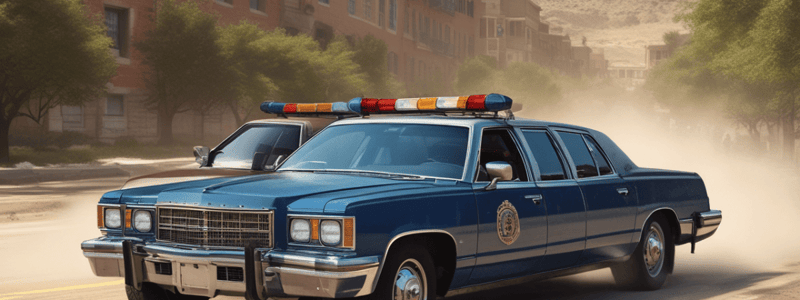Podcast
Questions and Answers
What is one of the factors to consider when selecting a location to execute a Vehicle Immobilization Tactic (VIT)?
What is one of the factors to consider when selecting a location to execute a Vehicle Immobilization Tactic (VIT)?
- Type of weapons
- Nature of offense
- Speed of the deputy's vehicle
- Proximity to innocent bystanders (correct)
What is required when there is contact between the deputy's vehicle and the suspect vehicle during a VIT?
What is required when there is contact between the deputy's vehicle and the suspect vehicle during a VIT?
- Supervisor Vehicle Immobilization Tactic Review
- Supervisor Use of Force Review (correct)
- Photographs of both vehicles
- None of the above
Why do deputies need to consider the suspect's criminal history during a VIT?
Why do deputies need to consider the suspect's criminal history during a VIT?
- To determine the appropriate use of force
- To assess the level of threat posed by the suspect (correct)
- To decide whether to activate emergency lights
- To determine the location of the VIT
What is an environmental factor to consider during a VIT?
What is an environmental factor to consider during a VIT?
What document is required to be completed after every VIT?
What document is required to be completed after every VIT?
When is a Supervisor Use of Force Review required?
When is a Supervisor Use of Force Review required?
What is not a factor to consider when deciding whether to employ a VIT?
What is not a factor to consider when deciding whether to employ a VIT?
What is a requirement after a VIT has been employed?
What is a requirement after a VIT has been employed?
Who can employ the Vehicle Immobilization Tactic (VIT)?
Who can employ the Vehicle Immobilization Tactic (VIT)?
When is a written explanation required on the Supervisor Vehicle Immobilization Tactic Review?
When is a written explanation required on the Supervisor Vehicle Immobilization Tactic Review?
What is the minimum number of law enforcement vehicles required to initiate a VIT?
What is the minimum number of law enforcement vehicles required to initiate a VIT?
On what type of vehicle can the VIT never be employed?
On what type of vehicle can the VIT never be employed?
What is a factor to consider when deciding to employ a VIT on a moving vehicle?
What is a factor to consider when deciding to employ a VIT on a moving vehicle?
What is the primary purpose of the VIT?
What is the primary purpose of the VIT?
Can a VIT be employed on a moving vehicle if it is not a forcible felony?
Can a VIT be employed on a moving vehicle if it is not a forcible felony?
What should be attempted when employing a VIT?
What should be attempted when employing a VIT?
What document needs to be completed if damage occurs to a deputy's vehicle or a suspect vehicle?
What document needs to be completed if damage occurs to a deputy's vehicle or a suspect vehicle?
Which team's tactics will not be limited by this policy?
Which team's tactics will not be limited by this policy?
Who needs to review and redact information from these Standard Operating Procedures before disclosure?
Who needs to review and redact information from these Standard Operating Procedures before disclosure?
What is the status of these Standard Operating Procedures under Florida Public Records Law?
What is the status of these Standard Operating Procedures under Florida Public Records Law?
What is the purpose of the Incident Damage Report (BSO RP#68)?
What is the purpose of the Incident Damage Report (BSO RP#68)?
Where should outside or public requests for information from these Standard Operating Procedures be directed?
Where should outside or public requests for information from these Standard Operating Procedures be directed?
What is the effective date of the reviewed and revised Standard Operating Procedures?
What is the effective date of the reviewed and revised Standard Operating Procedures?
What is the purpose of the notice at the end of the Standard Operating Procedures?
What is the purpose of the notice at the end of the Standard Operating Procedures?
Flashcards are hidden until you start studying
Study Notes
Vehicle Immobilization Tactic (VIT)
- VIT is a tactic employed to block-in and immobilize a vehicle that is stopped, moving slowly, or beginning to move.
- VIT can only be employed by deputies trained in the use of the tactic and assigned to a unit that attends quarterly SID Training.
- The decision to employ VIT rests solely with the deputy (or deputies) performing the VIT.
Conditions for VIT Employment
- VIT can only be employed in the arrest of felons.
- A minimum of two law enforcement vehicles must be available to initiate a VIT, unless a natural barrier exists in front or behind the vehicle.
- All attempts should be made to block the suspect vehicle from the front and back, with bumper to bumper contact.
- VIT can never be employed on motorcycles.
- VIT should only be employed on stationary vehicles.
Exceptions to VIT Employment
- VIT can be employed on a moving vehicle in order to take a person into custody who has committed a forcible felony as defined in SPM 7.8.2 E.
- Factors to consider when employing VIT on a moving vehicle include:
- The severity of the crime
- Whether the suspect poses an immediate threat to the safety of deputies or others
- Whether the suspect was actively resisting arrest or attempting to evade arrest by flight
Documentation and Reporting
- Every time a VIT is employed, the following documentation will be completed:
- Supervisor Vehicle Immobilization Tactic Review (BSO RP#159)
- Supervisor Use of Force Review (BSO RP#16) if contact is made between deputy’s vehicle and suspect vehicle
- Photographs of both the suspect and deputy’s vehicle
- Event report for incident requiring the VIT
- If damage occurs to either the deputy’s vehicle or the suspect vehicle, an Incident Damage Report (BSO RP#68) will be completed.
Studying That Suits You
Use AI to generate personalized quizzes and flashcards to suit your learning preferences.




